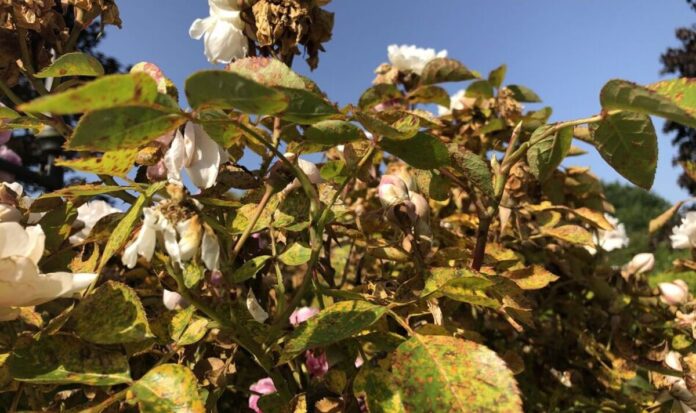Roses are one of the most popular and versatile flowering shrubs grown in UK gardens . However, one of the most common causes of failure with roses is poor disease control, according to gardening expert William Mitchell of Sutton Manor Nursery . He claimed that fungal diseases in plants like roses can be ‘extremely dangerous and can spread rapidly if not found and dealt with immediately’. Roses in particular can be ‘very susceptible to black spot’. Rose black spot is a fungal disease of roses where purple or black spots develop on the leaves, which often drop early. William warned: ‘This can completely defoliate a rose bush and can cause the branches or even the whole structure of the plant to weaken.’ Roses in particular can be ‘very susceptible to black spot’ (Image: Getty) Badly affected plants can shed almost all their leaves and their vigour is greatly reduced. The symptoms are so severe that this disease has been blamed for a decline in the popularity of roses in UK gardens in recent decades. William claimed that it is ‘hugely important’ to pick off any affected roses and bin them. If gardeners fail to bin them and they, therefore, sit on the soil or near other plants the fungal disease can ‘spread around the plants and cause a huge problem’. Badly affected plants can shed almost all their leaves (Image: Getty) The expert added: ‘If they are not stopped then the black spots can move not only roses but also throughout your whole garden.’ Rose black spot prevention involves good garden hygiene and a bit of research before going rose shopping. When buying a new rose, choose varieties that are described as ‘resistant to disease’. Another type of fungi that can be extremely dangerous to plants in September is mildew. They are quite commonly found on asters at the end of the summer months. Choose varieties which are described as ‘resistant to disease’ (Image: Getty) Mildew that is commonly found on asters is called powdery fungi. This specific fungus attacks a wide range of plants. It can be recognised by the white, dusty coating on leaves and stems on flowers. Willian urged: ‘It is hugely important to get rid of this mildew before it truly harms the plant.’ Powdery mildew thrives in dry conditions, for this reason, keep on top of watering asters if gardeners want to avoid mildew. However, it is important to not overwater these plants as this can also cause the growth of powdery mildew.
‘Dangerous’ rose plant disease that can spread rapidly if not dealt with quickly
Sourceexpress.co.uk
RELATED ARTICLES


